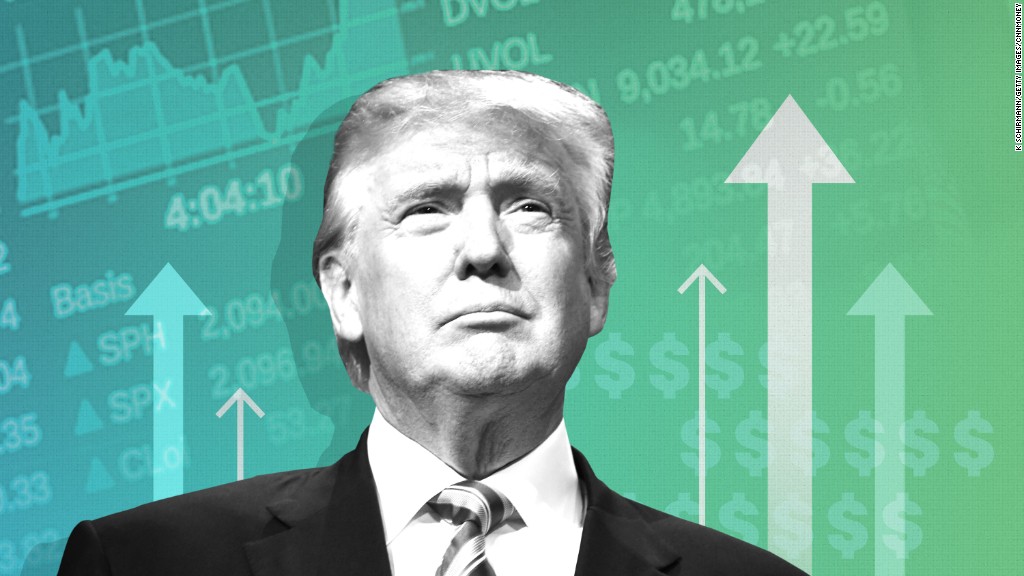
The Federal Reserve didn't raise interest rates on Wednesday, but it is still likely to do so at least one (if not two) more times this year.
Or so, Wall Street thinks.
But what happens if President Trump is not able to push any meaningful legislation through Congress this year?
In particular, if he's unsuccessful in getting tax reform done, is there any chance the economy could keep growing at a healthy rate?
Or will the U.S. be doomed to another few quarters of sluggish and subpar growth like the meager 0.7% annualized rate that the economy put up in the first quarter?
It could be difficult, if not impossible, for the economy to rise anywhere near the 3% rate that many in the Trump administration are hoping for, without tax reform.
Related: Trump is dialing back his economic promises
And it may be even more of a challenge to get to that level if Trump and Congress are unable to repeal and replace Obamacare, undo the Dodd-Frank financial reform laws, or pass a stimulus package that boosts infrastructure spending sometime this year.
Enter Janet Yellen.
The Fed chief might have to hop into a phone booth (assuming she can find one) and change into her Super Central Banker costume.
Bruce Bittles, chief investment strategist at Baird, argues that the Fed may need to slow down the pace of rate hikes in the event that Trump and Congress fail to do anything soon.
Bittles added that the Fed may even have to start cutting rates again if the economy suddenly loses steam.
The encouraging news though is that many consumers and businesses have expressed more confidence in the economy since Trump's victory.
But the bad news is that these good economic vibrations aren't giving people enough excitations to start buying more just yet.
Related: Ben Bernanke calls Trump's 3% growth goal a 'long shot'
The so-called soft data -- readings about sentiment -- are improving. But hard data, such as actual dollars spent, continue to lag.
"Economic data is a bit weaker than expected," said Quincy Krosby, a market strategist at Prudential Financial.
"We're trying to figure out the disconnect between the soft and hard data," she added. "To get the next leg up for the market and economy, we need the Trump agenda to really kick in." That might mean the Fed has to be really careful with its rate hike plans.
But would the Fed really want to lower rates just yet? It would be a signal that the central bank thinks the economy is in much worse shape than many thought, and could set off alarm bells.
The Fed is also being helped by the fact that long-term bond rates, which are often used as benchmarks for mortgages and other consumer and business loans, remain low despite the recent Fed rate hikes. That makes it cheap to borrow money.
So there's really no need for Yellen to hit the panic button. Growth may not be as good as it could be. But it's likely to gradually improve -- and nobody is fearing a return of inflation just yet either.
"Low long-term rates say to me that the bond market does not think inflation is a problem," said Mary Ann Hurley, vice president of fixed income trading at D.A. Davidson & Co. "What does that mean for the Fed? More rate hikes are coming."
Matt Schreiber, president of WBI Investments, agrees that the Fed still has time to wait and see what happens in Washington before it takes the bold move to shift gears.
Related: Economy grew at slowest pace in 3 years during the first quarter
But he said it's not out of the question that the Fed may need to reverse course in 2018.
"Could the Fed have to intervene to stimulate the economy? If you don't get tax cuts, infrastructure spending and other things that could stimulate the economy, the Fed may have to step in," he said.
Of course, there's no guarantee that it will be Yellen's decision to make come next year. Her four-year term as Fed chair ends on February 3, 2018.
Many Fed watchers have assumed Trump will want to appoint his own Fed chair -- especially since he criticized her on the campaign trail for keeping rates too low.
Trump alleged Yellen was doing so to help Hillary Clinton's chances of winning and make President Obama look good.
Related: Reminder: Tax cuts don't actually make the economy soar
But Candidate Trump and President Trump don't seem to share the same opinions on many things -- including Yellen. Trump recently said in an interview with The Wall Street Journal that Yellen was not "toast" as widely thought.
"I like her, I respect her. It's very early. I do like a low-interest rate policy, I must be honest with you," Trump told the WSJ.
With that in mind, Bittles thinks there's now about a 50% chance that Trump will opt to keep Yellen for a second term -- assuming she wants it, of course.
Writing a book for big bucks, taking a high-paying consulting job or retreating back to the world of academia might be a refreshing change of pace. Just ask former Fed chairs Alan Greenspan and Ben Bernanke.


